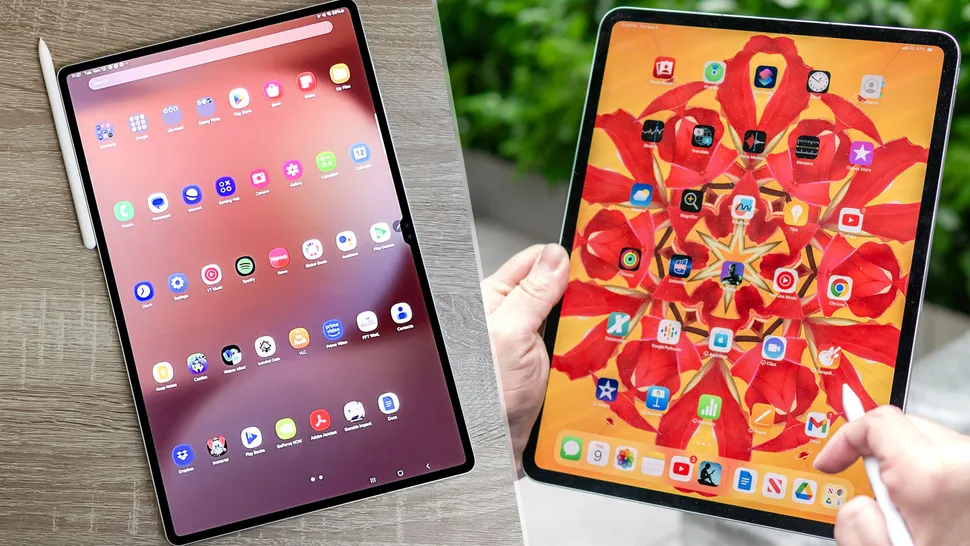In 2025, the tablet market is more competitive than ever, and two devices stand at the forefront of premium productivity and entertainment: the Samsung Galaxy Tab S10 Ultra and the Apple iPad Air 11″ (M3). While both are designed to deliver high performance, sleek design, and versatile functionality, they cater to slightly different audiences and use cases.
Whether you’re a creative professional, a student, or a multitasking enthusiast, choosing between these two giants requires a closer look at what each brings to the table. Let’s break down the specs, features, and real-world usability to help you decide which tablet deserves your investment.
Design and Build: Size vs Portability
The Galaxy Tab S10 Ultra is unapologetically large, featuring a 14.6-inch Dynamic AMOLED display with a screen-to-body ratio of 90.77%. It’s built for immersive viewing and multitasking, but its 723g weight and larger footprint make it less portable than the iPad Air.
The iPad Air 11″, on the other hand, is compact and lightweight at 460g, with an 11-inch IPS LCD display and an 82.73% screen-to-body ratio. It’s easier to carry and use one-handed, making it ideal for students and casual users.
Both tablets feature aluminum builds and premium finishes, but the Tab S10 Ultra adds IP68 water resistance, giving it an edge in durability.
Display: AMOLED vs LCD
Samsung’s Tab S10 Ultra boasts a 2960 × 1848 resolution, 120Hz refresh rate, and HDR support, making it perfect for media consumption, gaming, and creative work. The AMOLED panel delivers deep blacks, vibrant colors, and excellent contrast.
Apple’s iPad Air 11″ uses a 2360 × 1640 IPS LCD with a standard 60Hz refresh rate. While it’s bright and color-accurate, it lacks the fluidity and depth of Samsung’s AMOLED display. For artists and gamers, the Tab S10 Ultra offers a more visually engaging experience.
Performance: Dimensity 9300+ vs Apple M3
The Galaxy Tab S10 Ultra is powered by the MediaTek Dimensity 9300+, a 4nm octa-core chip paired with up to 16GB RAM and 1TB storage. It handles multitasking, gaming, and creative apps with ease, and supports microSD expansion up to 1TB.
The iPad Air 11″ features Apple’s M3 chip, the same silicon found in MacBooks. With 8GB RAM and up to 1TB storage, it delivers blazing-fast performance, especially in single-core tasks and optimized apps. However, it lacks expandable storage.
In benchmarks, the M3 edges out the Dimensity 9300+ in raw CPU performance, but Samsung’s GPU and multitasking capabilities hold their own in real-world usage.
Battery Life and Charging
Samsung packs a massive 11,200mAh battery into the Tab S10 Ultra, supporting 45W fast charging. It delivers up to 11 hours of gaming, 8.5 hours of video, and nearly 5 hours of web browsing.
The iPad Air 11″ includes a 7606mAh battery, offering 9.5 hours of video, 6.5 hours of gaming, and 4.2 hours of browsing. Charging is slower at 30W, and battery life is slightly shorter overall.
For power users and travelers, the Tab S10 Ultra offers better endurance and faster top-ups.
Cameras and Multimedia
Samsung equips the Tab S10 Ultra with a dual rear camera setup: a 13MP main sensor and an 8MP ultra-wide lens, plus a 12MP dual front camera. It supports 4K video at 60fps, making it suitable for content creation and video conferencing.
Apple’s iPad Air 11″ has a 12MP rear camera and a 12MP front camera, with 1080p video recording. While image quality is solid, it lacks the versatility of Samsung’s dual setup.
Both tablets feature multiple speakers with Dolby Atmos support, but Samsung’s larger chassis allows for deeper bass and better stereo separation.
Software and Ecosystem
The Tab S10 Ultra runs Android 14 with Samsung’s One UI, offering features like DeX mode, multi-window multitasking, and S Pen support (included). It’s a productivity powerhouse, especially for users who want a laptop-like experience.
The iPad Air 11″ runs iPadOS 18, optimized for Apple’s ecosystem. It supports Stage Manager, Apple Pencil (sold separately), and seamless integration with iPhones and Macs. For users already invested in Apple’s ecosystem, the iPad Air offers unmatched continuity.
Connectivity and Extras
Samsung supports Wi-Fi 7, Bluetooth 5.3, USB-C 3.2, and GPS with Galileo and BeiDou. It also includes an in-display fingerprint sensor and face unlock.
Apple supports Wi-Fi 6E, Bluetooth 5.3, USB-C, and Touch ID. It lacks face unlock and expandable storage but benefits from direct OS updates and long-term support.
Pricing and Value
- Samsung Galaxy Tab S10 Ultra: Starts at ₹89,999 for 12GB + 256GB
- Apple iPad Air 11″ (M3): Starts at ₹69,900 for 8GB + 128GB
Samsung offers more RAM, a larger display, and a stylus in the box. Apple counters with a more compact design, faster single-core performance, and better long-term software support.
Final Verdict: Which One Should You Buy?
If you’re looking for a desktop-class tablet with a massive display, multitasking muscle, and creative flexibility, the Galaxy Tab S10 Ultra is the clear winner. It’s ideal for artists, gamers, and professionals who want a laptop alternative.
If you prefer portability, simplicity, and ecosystem integration, the iPad Air 11″ is a smart choice. It’s perfect for students, casual users, and anyone already using Apple devices.
Ultimately, your choice depends on your workflow, preferences, and budget. Both tablets are excellent—but they serve different needs.
FAQ: Galaxy Tab S10 Ultra vs iPad Air 11″
Q: Which tablet has better display quality?
A: The Tab S10 Ultra’s AMOLED panel offers better contrast, refresh rate, and HDR support than the iPad Air’s LCD.
Q: Is the S Pen included with the Galaxy Tab S10 Ultra?
A: Yes, Samsung includes the S Pen in the box. Apple Pencil is sold separately for the iPad Air.
Q: Which tablet is better for gaming?
A: The Tab S10 Ultra has a larger screen, better speakers, and longer battery life, making it more suitable for gaming.
Q: Can I expand storage on either tablet?
A: Only the Galaxy Tab S10 Ultra supports microSD expansion up to 1TB.
Q: Which tablet is more portable?
A: The iPad Air 11″ is lighter and more compact, making it easier to carry.
Q: Do both support keyboard accessories?
A: Yes, both support official keyboard cases and third-party Bluetooth keyboards.
Q: Which tablet gets longer software support?
A: Apple typically offers 5+ years of updates, while Samsung provides 4 years of OS updates and 5 years of security patches.



